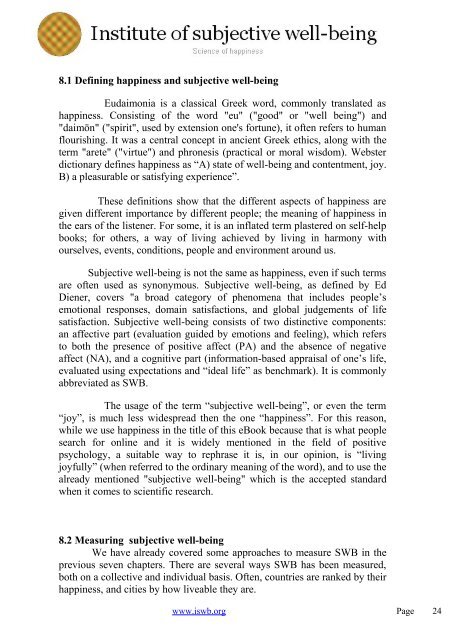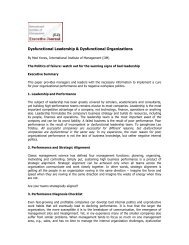Happiness Formulas - Subjective well-being: Institute of subjective ...
Happiness Formulas - Subjective well-being: Institute of subjective ...
Happiness Formulas - Subjective well-being: Institute of subjective ...
Create successful ePaper yourself
Turn your PDF publications into a flip-book with our unique Google optimized e-Paper software.
8.1 Defining happiness and <strong>subjective</strong> <strong>well</strong>-<strong>being</strong><br />
Eudaimonia is a classical Greek word, commonly translated as<br />
happiness. Consisting <strong>of</strong> the word "eu" ("good" or "<strong>well</strong> <strong>being</strong>") and<br />
"daimōn" ("spirit", used by extension one's fortune), it <strong>of</strong>ten refers to human<br />
flourishing. It was a central concept in ancient Greek ethics, along with the<br />
term "arete" ("virtue") and phronesis (practical or moral wisdom). Webster<br />
dictionary defines happiness as “A) state <strong>of</strong> <strong>well</strong>-<strong>being</strong> and contentment, joy.<br />
B) a pleasurable or satisfying experience”.<br />
These definitions show that the different aspects <strong>of</strong> happiness are<br />
given different importance by different people; the meaning <strong>of</strong> happiness in<br />
the ears <strong>of</strong> the listener. For some, it is an inflated term plastered on self-help<br />
books; for others, a way <strong>of</strong> living achieved by living in harmony with<br />
ourselves, events, conditions, people and environment around us.<br />
<strong>Subjective</strong> <strong>well</strong>-<strong>being</strong> is not the same as happiness, even if such terms<br />
are <strong>of</strong>ten used as synonymous. <strong>Subjective</strong> <strong>well</strong>-<strong>being</strong>, as defined by Ed<br />
Diener, covers "a broad category <strong>of</strong> phenomena that includes people’s<br />
emotional responses, domain satisfactions, and global judgements <strong>of</strong> life<br />
satisfaction. <strong>Subjective</strong> <strong>well</strong>-<strong>being</strong> consists <strong>of</strong> two distinctive components:<br />
an affective part (evaluation guided by emotions and feeling), which refers<br />
to both the presence <strong>of</strong> positive affect (PA) and the absence <strong>of</strong> negative<br />
affect (NA), and a cognitive part (information-based appraisal <strong>of</strong> one’s life,<br />
evaluated using expectations and “ideal life” as benchmark). It is commonly<br />
abbreviated as SWB.<br />
The usage <strong>of</strong> the term “<strong>subjective</strong> <strong>well</strong>-<strong>being</strong>”, or even the term<br />
“joy”, is much less widespread then the one “happiness”. For this reason,<br />
while we use happiness in the title <strong>of</strong> this eBook because that is what people<br />
search for online and it is widely mentioned in the field <strong>of</strong> positive<br />
psychology, a suitable way to rephrase it is, in our opinion, is “living<br />
joyfully” (when referred to the ordinary meaning <strong>of</strong> the word), and to use the<br />
already mentioned "<strong>subjective</strong> <strong>well</strong>-<strong>being</strong>" which is the accepted standard<br />
when it comes to scientific research.<br />
8.2 Measuring <strong>subjective</strong> <strong>well</strong>-<strong>being</strong><br />
We have already covered some approaches to measure SWB in the<br />
previous seven chapters. There are several ways SWB has been measured,<br />
both on a collective and individual basis. Often, countries are ranked by their<br />
happiness, and cities by how liveable they are.<br />
www.iswb.org Page 24




